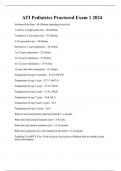Exam (elaborations)
ATI Pediatrics Proctored Exam 1 2024
- Course
- ATI RN Mental Health
- Institution
- Chamberlain College Of Nursing
Newborn Pulse Rate - 80-180/min depending on activity 1 week to 3 months pulse rate: - 80-220/min 3 months to 2 years pulse rate: - 70-150/min 2-10 years pulse rate: - 50-90/min Newborn to 1 year respirations: - 30-35/min 1 to 2 years respirations: - 25-30/min 2 to 6 years respira...
[Show more]



